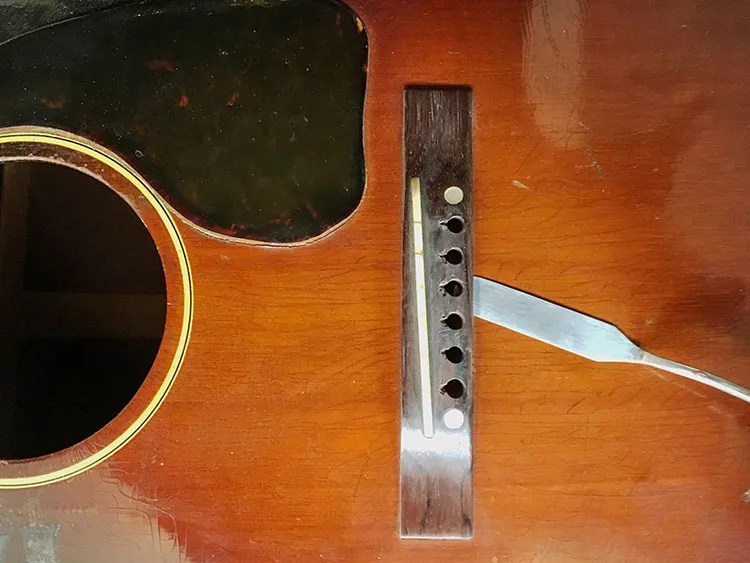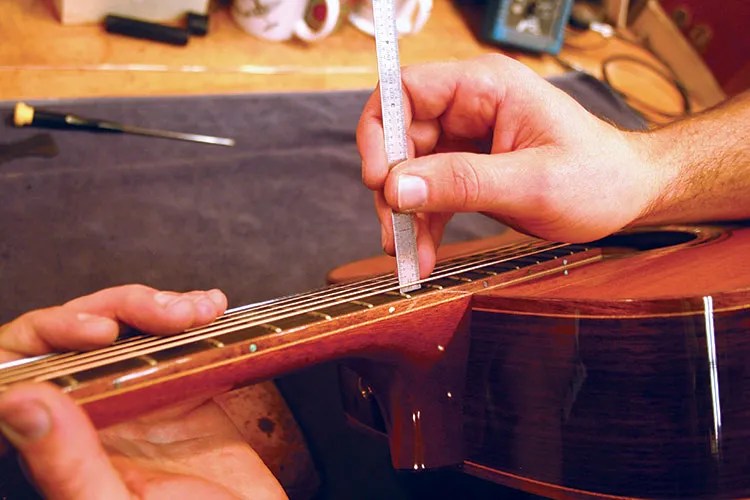Ask the Expert: Sound Advice for Making a Living in Lutherie
Q: I’m going into my senior year of high school next fall, and I’m starting to think about careers and things like that. I’ve just begun exploring lutherie, since I enjoy both playing guitar and woodworking. I have read two books on the subject: The Luthier’s Handbook by Roger H. Siminoff and The Steel String Guitar: Construction & Repair by David Russell Young. Where do I go from here? —Jacob Glath, via email
A: Thanks for your question. Not surprisingly, I have a lot to say about this! When I began building instruments, I had already been modifying and rewiring guitars for several years, mostly learning from online resources and my own mistakes. You’ve begun in a good place with those two books, and I encourage you to read the other classics on the subject—William Cumpiano and Jonathan Natelson’s Guitarmaking: Tradition and Technology, Bob Benedetto’s Making an Archtop Guitar, and Irving Sloane’s books on building and repair, such as Classic Guitar Construction and Steel-String Guitar Construction. I particularly encourage these because they describe a process that predates many of the specialized tools, jigs, and fixtures that are now on the market—in the 1960s and ’70s, luthiers had to do lots of problem-solving to invent the tools and techniques that have now become standard, and that skill is particularly good to begin developing early.
Perhaps above all, I’d recommend starting right away by finding some inexpensive broken guitars and trying to repair them. There is a nearly endless supply of these instruments tucked away in closets, attics, and yard sales, with every problem from broken headstocks to loose bridges, cracked tops, loose braces; the list goes on. Often, people are happy to give them away. This type of practice is incredibly valuable on many levels. It is a great way to learn about glue types and techniques, clamping, and the inner workings and details of instrument construction, and it also builds up a very marketable skill set. If you can properly re-glue loose bridges, fix top cracks, and detail frets, there is paid work available almost anywhere you go. Mending broken headstocks alone can be a fairly decent income stream! Fixing and reselling these guitars is also a good way to finance tools and equipment.
ADVERTISEMENT
There are many online resources that I could recommend—and, generally speaking, you should always read as much as you can. There is no one single “right” way to build, or to learn, and different people are attracted to different approaches; some dive straight into the modern world of CNC and 3D modeling, while others choose to build completely “unplugged.” Wonderful guitars can be made either way, and, in my humble opinion, a beginning builder should make an effort to understand both approaches.
I can’t even begin to cover all the various forums and groups online—and frankly, there are some that should really be avoided. There is no qualification required to post things online, so not everything you read is necessarily true or helpful. However, I’d like to particularly point out two sites which served me very well, and continue to be excellent resources for both hobbyists and active professionals. Musical Instrument Makers Forum offers free membership, and includes an archive of discussions on nearly every topic of instrument construction, with contributions from a number of well-known makers. Alongside that, I can’t speak highly enough of the incredible frets.com website compiled by Frank Ford, which is arguably the most comprehensive and well-documented source of genuine, high-quality information on guitar repair. There are decades’ worth of real experience available at no cost between these two sites, and I recommend them to everyone that asks about getting into guitar making.
I should also mention the GAL (Guild of American Luthiers) and ASIA (Association of Stringed Instrument Artisans), which include some of today’s most celebrated builders. Membership in these organizations is not free, but they are a great way to connect with nearby makers, and to stay informed on new developments in the field.
If you are fortunate to have a working luthier nearby, contact them and see if they would allow you to visit. Almost all the guitar makers I know are generous and open with information, and willing to help. If you are lucky, they may be looking for an apprentice or shop helper. A word of caution, however: Please keep in mind that, like all creative people, most luthiers have busy work lives and many demands on their time. Be respectful of their time and experience, and demonstrate your ability to listen. I would much rather hire someone who wants to learn than someone who thinks they already know how everything works. Ask questions, be polite, and don’t try to show off what you already know—an open mind is much more impressive.
ADVERTISEMENT
There are a number of fine lutherie schools around the country, and their programs continue to evolve to meet the needs of both the students and the companies who seek to hire their graduates. Although this was not part of my own path to guitar making, many of my colleagues (including some of today’s truly great builders) are graduates of these courses. The programs have different strengths and priorities, and if you choose to make the investment in a formal program, it is well worth doing some research to choose the one that best suits your approach and your desired goal.

Finally, it is important to consider what your goal will be in pursuing guitar making. Do you hope to make it a career, or just a satisfying hobby? Would you prefer to be a one-person shop making custom instruments, or part of a team in a production setting? Is repair and restoration something you find exciting? Answering these questions will be essential in guiding you towards the best path forward. Most people find the process exciting, fun, and quite addicting, so be prepared to get drawn in. If you hope to pursue the craft as a career, educate yourself on the basics of business, train yourself early to keep track of your time and expenses, minimize your expenditures on tools and equipment, and learn to be realistic about estimating and billing for work. Be honest with yourself and your clients about your skill level, and bill accordingly—overcharging is a mistake, but so is undervaluing your work and the services you offer. I have seen many aspiring builders and repair techs get into trouble because these crucial aspects of their businesses were not attended to. The economic life of the freelance guitar maker can be unsteady at best, and learning these skills early can make the difference between a viable career and a short-lived endeavor.
After 20 years in the profession, I still find guitar building deeply engaging, fun, and rewarding. I have formed lifetime friendships with colleagues in the field, who are among the most creative, clever, and passionate people I’ve ever met. I plan to continue building and learning for as long as I can, and I hope you experience some of the same joy and satisfaction.
GOT A QUESTION? Uncertain about guitar care and maintenance? The ins-and-outs of guitar building? Or another topic related to your gear? Ask Acoustic Guitar’s repair expert Martin Keith by sending an email titled “Repair Expert” to Editors.AG@stringletter.com.







An excellent article shared by you. I am interested in a guitar repair job. I have already started with my own guitar repairing by installing some genuine guitar parts. From the beginning of my professional life, I found your article very much helpful to me. I am definitely going to contact you. But could not find your address here!